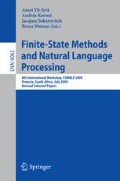Abstract
The terms grammatical inference and grammar induction both seem to indicate that techniques aiming at building grammatical formalisms when given some information about a language are not concerned with automata or other finite state machines. This is far from true, and many of the more important results in grammatical inference rely heavily on automata formalisms, and particularly on the specific use of determinism that is made. We survey here some of the main ideas and results in the field.
This work was partially supported by the IST Programme of the European Community, under the Pascal 2 Network of Excellence, Ist–2006-216886.
Access this chapter
Tax calculation will be finalised at checkout
Purchases are for personal use only
Preview
Unable to display preview. Download preview PDF.
References
Sakakibara, Y.: Recent advances of grammatical inference. Theoretical Computer Science 185, 15–45 (1997)
de la Higuera, C.: A bibliographical study of grammatical inference. Pattern Recognition 38, 1332–1348 (2005)
de la Higuera, C.: Data complexity issues in grammatical inference. In: Basu, M., Ho, T.K. (eds.) Data Complexity in Pattern Recognition, pp. 153–172. Springer, Heidelberg (2006)
Gold, E.M.: Language identification in the limit. Information and Control 10(5), 447–474 (1967)
Gold, E.M.: Complexity of automaton identification from given data. Information and Control 37, 302–320 (1978)
Pitt, L.: Inductive inference, Dfa’s, and computational complexity. In: Jantke, K.P. (ed.) AII 1989. LNCS (LNAI), vol. 397, pp. 18–44. Springer, Heidelberg (1989)
de la Higuera, C.: Characteristic sets for polynomial grammatical inference. Machine Learning Journal 27, 125–138 (1997)
de la Higuera, C., Janodet, J.C., Tantini, F.: Learning languages from bounded resources: the case of the DFA and the balls of strings. In: Clark, A., Coste, F., Miclet, L. (eds.) ICGI 2008. LNCS, vol. 5278, pp. 43–56. Springer, Heidelberg (2008)
Dupont, P., Miclet, L., Vidal, E.: What is the search space of the regular inference? In: [29], pp. 25–37
Lang, K.J., Pearlmutter, B.A., Price, R.A.: Results of the Abbadingo one DFA learning competition and a new evidence-driven state merging algorithm. In: Honavar, V., Slutski, G. (eds.) ICGI 1998. LNCS (LNAI), vol. 1433, pp. 1–12. Springer, Heidelberg (1998)
Oncina, J., García, P.: Identifying regular languages in polynomial time. In: Bunke, H. (ed.) Advances in Structural and Syntactic Pattern Recognition. Series in Machine Perception and Artificial Intelligence, vol. 5, pp. 99–108. World Scientific, Singapore (1992)
de la Higuera, C.: Grammatical inference: learning automata and grammars. Cambridge University Press, Cambridge (2010)
Angluin, D.: Inductive inference of formal languages from positive data. Information and Control 45, 117–135 (1980)
García, P., Vidal, E.: Inference of k-testable languages in the strict sense and applications to syntactic pattern recognition. Pattern Analysis and Machine Intelligence 12(9), 920–925 (1990)
Angluin, D.: Inference of reversible languages. Journal of the Association for Computing Machinery 29(3), 741–765 (1982)
Angluin, D., Kharitonov, M.: When won’t membership queries help? In: Proceedings of 24th Acm Symposium on Theory of Computing, pp. 444–454. ACM Press, New York (1991)
Kearns, M.J., Vazirani, U.: An Introduction to Computational Learning Theory. MIT press, Cambridge (1994)
Angluin, D.: Queries and concept learning. Machine Learning Journal 2, 319–342 (1987)
Angluin, D.: Negative results for equivalence queries. Machine Learning Journal 5, 121–150 (1990)
Angluin, D.: Learning regular sets from queries and counterexamples. Information and Control 39, 337–350 (1987)
Carrasco, R.C., Oncina, J.: Learning stochastic regular grammars by means of a state merging method. In: [29], pp. 139–150
Thollard, F., Dupont, P., de la Higuera, C.: Probabilistic Dfa inference using Kullback-Leibler divergence and minimality. In: Proceedings of the 17th International Conference on Machine Learning, pp. 975–982. Morgan Kaufmann, San Francisco (2000)
Ron, D., Singer, Y., Tishby, N.: Learning probabilistic automata with variable memory length. In: Proceedings of COLT 1994, pp. 35–46. ACM Press, New Brunswick (1994)
Denis, F., Esposito, Y.: Learning classes of probabilistic automata. In: Shawe-Taylor, J., Singer, Y. (eds.) COLT 2004. LNCS, vol. 3120, pp. 124–139. Springer, Heidelberg (2004)
Oncina, J., García, P., Vidal, E.: Learning subsequential transducers for pattern recognition interpretation tasks. Pattern Analysis and Machine Intelligence 15(5), 448–458 (1993)
Oncina, J., Varó, M.A.: Using domain information during the learning of a subsequential transducer. In: [30], pp. 301–312
Vilar, J.M.: Query learning of subsequential transducers. In: [30], pp. 72–83
de la Higuera, C.: Ten open problems in grammatical inference. In: Sakakibara, Y., Kobayashi, S., Sato, K., Nishino, T., Tomita, E. (eds.) ICGI 2006. LNCS (LNAI), vol. 4201, pp. 32–44. Springer, Heidelberg (2006)
Carrasco, R.C., Oncina, J. (eds.): ICGI 1994. LNCS (LNAI), vol. 862. Springer, Heidelberg (1994)
Miclet, L., de la Higuera, C. (eds.): ICGI 1996. LNCS (LNAI), vol. 1147. Springer, Heidelberg (1996)
Author information
Authors and Affiliations
Editor information
Editors and Affiliations
Rights and permissions
Copyright information
© 2010 Springer-Verlag Berlin Heidelberg
About this paper
Cite this paper
de la Higuera, C. (2010). Learning Finite State Machines. In: Yli-Jyrä, A., Kornai, A., Sakarovitch, J., Watson, B. (eds) Finite-State Methods and Natural Language Processing. FSMNLP 2009. Lecture Notes in Computer Science(), vol 6062. Springer, Berlin, Heidelberg. https://doi.org/10.1007/978-3-642-14684-8_1
Download citation
DOI: https://doi.org/10.1007/978-3-642-14684-8_1
Publisher Name: Springer, Berlin, Heidelberg
Print ISBN: 978-3-642-14683-1
Online ISBN: 978-3-642-14684-8
eBook Packages: Computer ScienceComputer Science (R0)

